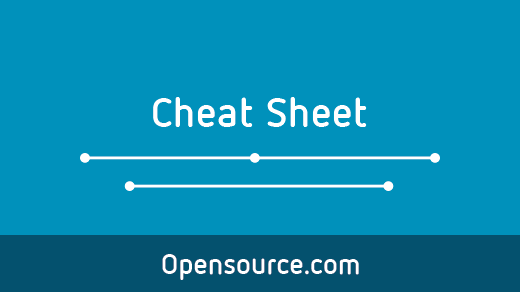Sometimes you need the short version. You know what you want to do and you just can't recall exactly how to do it. That's when cheat sheets come in handy. In this article, I suggest a cheat sheet to get you going with MariaDB and MySQL. This cheat sheet is great for the occassional database user. Next, I have listed two Raspberry Pi cheat sheets. The first gets you started with this single-board computer. Once you're comfortable with the basics, turn it into a home lab and begin working with Kubernetes container management. Be sure to grab the next cheat sheet at the same time, because it covers the kubectl tool. Next, there is a great cheat sheet for Emacs, and another for the C programming language. Finally, the list concludes with two very practical cheat sheets: Collaboration tools and open source alternatives.
Here is the list:
MariaDB and MySQL cheat sheet
MariaDB is an enterprise-grade database. Learning MariaDB is a great step toward using it to manage web applications or programming language libraries. This MariaDB and MySQL cheat sheet covers useful commands for connecting to servers, analyzing data, and other key activities. The commands on this cheat sheet are valid for the interactive prompt and SQL scripts, but much can be extrapolated for use with programming libraries as well.
Raspberry Pi: How to get started
Since 2012, the Raspberry Pi has been a must-have for learning programming skills, building hardware projects, doing home automation, and creating applications. Its affordable price makes it attractive to open source enthusiasts of any skill level. This downloadable guide will set you up for success with tips on choosing a Raspberry Pi, keeping it updated, using it for Linux gaming, contributing to the community, and so much more.
Running Kubernetes on your Raspberry Pi home lab
Building a home lab has become increasingly accessible thanks to the affordability and versatility of the Raspberry Pi single-board computer. There are thousands of things you can do with a Raspberry Pi, including experimenting with Kubernetes. In this eBook, author Chris Collins demonstrates how to get started running Kubernetes on your Raspberry Pi. Each section of this guide can be treated in isolation or as a holistic project. Regardless of your day job, reading these tutorials and trying them out at your own pace is sure to boost your cloud technology prowess.
Kubectl cheat sheet
Kubectl is a powerful command-line tool to maintain your Kubernetes cluster. This 2-page cheat sheet covers commonly used commands to take you above and beyond average cluster administration. It's broken up into three different sections, including basic commands, troubleshooting commands, and advanced commands. Keep these nine critical kubectl commands handy to help you with troubleshooting and managing your Kubernetes cluster administration.
Emacs cheat sheet
It's nearly impossible to remember every single Emacs shortcut there is to know. With this cheat sheet, you can familiarize yourself with the most common combinations so you can be more efficient. When you have this guide at your side, you can forget about forgetting Emacs keyboard shortcuts. Become an Emacs power user by learning the essential keyboard shortcuts demonstrated in this cheat sheet.
C programming cheat sheet
C is a straightforward compiled programming language. Other programming languages borrow concepts from C, making C a great starting point if you want to learn programming languages such as Lua, C++, Java, or Go. This double-sided cheat sheet by Jim Hall has all the basics so you can immediately access all the essentials of C syntax. Learn C by downloading this cheat sheet and keep syntax essentials handy.
5 open source collaboration tools
Kevin Sonney's productivity guide makes collaboration a breeze with five open source tool tutorials. Tools covered in this download include open source email clients, an alternative to Google Docs, and more. Leave team miscommunication in the past and say hello to team productivity.
Open source software alternatives cheat sheet
In our vast world of open source, there are plenty of alternatives to common proprietary software tools. However, it can be daunting sometimes to find the right open source option to fit your specific needs. That's why we put together this one-page cheat sheet to cover the major software tool categories, including team chat, file sharing, word processing, and more. We didn't stop with office tools. We also included top open source applications for gaming, social media, and personal finance. Quickly find alternatives to common proprietary software tools with this cheat sheet.
Wrap up
This list covers a lot of topics. Check out dozens more cheat sheets and guides on our downloads page. Let us know which is your favorite in the comments below. Don't forget to write and submit cheat sheets for your favorite open source tools.








Comments are closed.